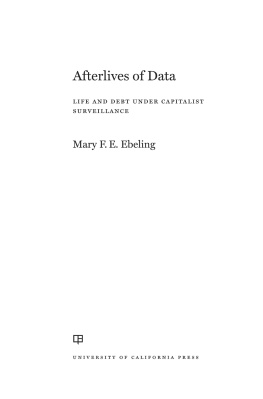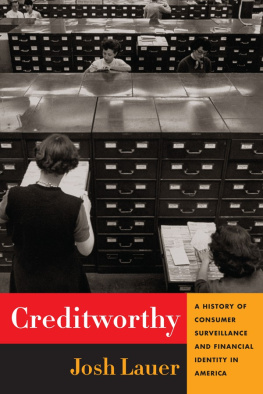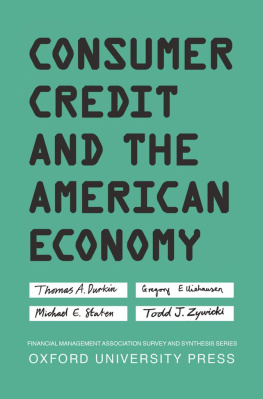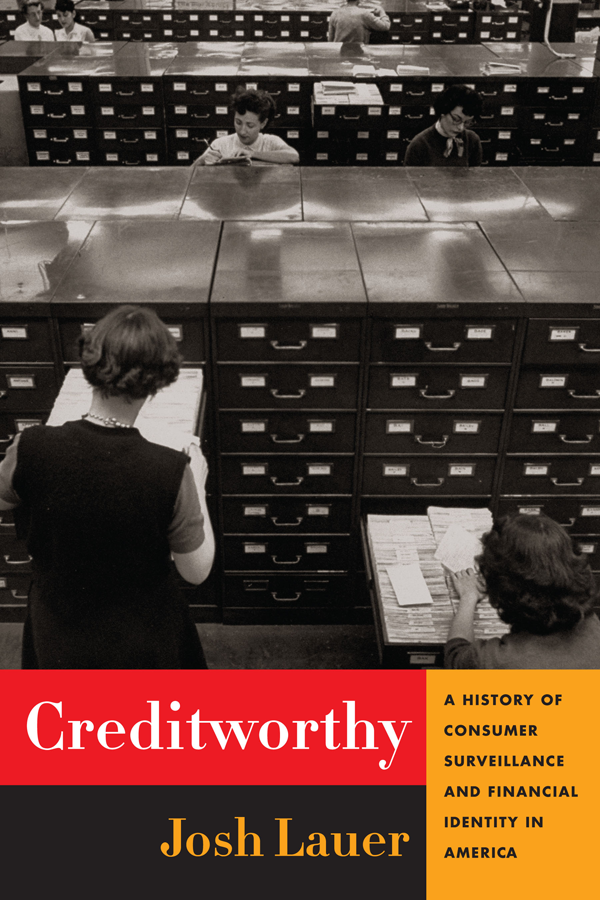Contents
Guide
Pagebreaks of the print version
Creditworthy
Columbia Studies in the History of U.S. Capitalism
Columbia Studies in the History of U.S. Capitalism
Series Editors: Devin Fergus, Louis Hyman, Bethany Moreton, and Julia Ott
Capitalism has served as an engine of growth, a source of inequality, and a catalyst for conflict in American history. While remaking our material world, capitalisms myriad forms have alteredand been shaped byour most fundamental experiences of race, gender, sexuality, nation, and citizenship. This series takes the full measure of the complexity and significance of capitalism, placing it squarely back at the center of the American experience. By drawing insight and inspiration from a range of disciplines and alloying novel methods of social and cultural analysis with the traditions of labor and business history, our authors take history from the bottom up all the way to the top.
Capital of Capital: Money, Banking, and Power in New York City , by Steven H. Jaffe and Jessica Lautin
From Head Shops to Whole Foods: The Rise and Fall of Activist Entrepreneurs , by Joshua Clark Davis
Creditworthy
A History of Consumer Surveillance and Financial Identity in America
Josh Lauer

Columbia University Press New York
Columbia University Press
Publishers Since 1893
New YorkChichester, West Sussex
cup.columbia.edu
Copyright 2017 Columbia University Press
All rights reserved
E-ISBN 978-0-231-54462-7
Library of Congress Cataloging-in-Publication Data
Names: Lauer, Josh (Professor of communication), author.
Title: Creditworthy : a history of consumer surveillance and financial identity in America / Josh Lauer.
Other titles: Credit worthy
Description: New York : Columbia University Press, [2017] | Series: Columbia studies in the history of U.S. capitalism | Includes bibliographical references and index.
Identifiers: LCCN 2016050103 (print) | LCCN 2017015938 (ebook) | ISBN 9780231168083 (cloth : alk. paper)
Subjects: LCSH: Credit analysisUnited StatesHistory.
Classification: LCC HG3701 (ebook) | LCC HG3701 L35 2017 (print) | DDC 332.70973dc23
LC record available at https://lccn.loc.gov/2016050103
A Columbia University Press E-book.
CUP would be pleased to hear about your reading experience with this e-book at .
Cover design: Milenda Nan Ok Lee
Cover image: Walter Sanders/Life Picture Collection Getty Images. Clerks consult credit files at the Credit Bureau of Greater New York, 1953.
Contents
If one must go into debt, then debts of gratitude are the best to accumulate. It is a pleasure to reckon the long columns of beneficenceinstitutional, intellectual, and personalthat have underwritten this work.
This project began at the University of Pennsylvanias Annenberg School for Communication, where I had the privilege to study with Joseph Turow, Barbie Zelizer, Oscar Gandy, and Katherine Sender. I was drawn to the Annenberg School by the work of Carolyn Marvin, whose cultural histories of technology inspired my own scholarly ambitions. I am lucky to have had Carolyn as a teacher, mentor, and friend.
I have also been fortunate to land among so many smart, generous colleagues at the University of New Hampshire. I am especially grateful to three department chairsLawrence Prelli, Joshua Meyrowitz, and James Farrellwho each went out of their way to help secure time and scarce resources in support of my research.
Financial support for this work was provided by the University of New Hampshire, including a Summer Faculty Fellowship from the Graduate School, a travel stipend from the Research and Engagement Academy, and an invaluable semester-long Center for the Humanities Faculty Fellowship. I also received a travel grant from the DeGolyer Library at Southern Methodist University to visit the J.C. Penney archives, where I enjoyed the expert assistance of Joan Gosnell. Thanks also to the interlibrary loan staffs at the University of Pennsylvania and the University of New Hampshire, and to Sharon Black at the Annenberg School library.
Portions of this book have been published elsewhere. A version of appeared as Making the Ledgers Talk: Customer Control and the Origins of Retail Data Mining, 19201940, in The Rise of Marketing and Market Research, edited by Hartmut Berghoff, Philip Scranton, and Uwe Spiekermann (Palgrave Macmillan, 2012). Material from several chapters appears in The End of Judgment: Consumer Credit Scoring and Managerial Resistance to the Black Boxing of Creditworthiness, in The Emergence of Routines: Entrepreneurship, Organization, and Business History, edited by Daniel M.G. Raff and Philip Scranton (Oxford University Press, 2017). Archival material from the R.G. Dun Collection is quoted with permission from Harvard Business Schools Baker Library.
My thinking about this project has been enriched by feedback from co-panelists and audiences at many conferences, including those sponsored by the International Communication Association, the National Communication Association, the Business History Conference, the Hagley Museum and Library, the Organization of American Historians, the History of Science Society, and the Economic and Business History Society. I am especially grateful to Claire Lemercier and Claire Zalc for the opportunity to share my work at cole Normale Suprieure in Paris; to Daniel Raff and Philip Scranton for including me in a workshop at the University of Pennsylvanias Wharton School; to Robert Hunt for bringing me to the Federal Reserve Bank of Philadelphia; to David Lyon and Sachil Singh for hosting me at Queens Universitys Surveillance Studies Centre; to Lana Swartz for involving me in a money-themed symposium at the University of Southern Californias Annenberg School for Communication and Journalism; and to Rowena Olegario for including me in a corporate reputation symposium at the University of Oxfords Sad Business School.
In addition to those already named, many others have guided my thinking and sharpened my arguments through conversations and, in many cases, through their own work. Thank you to Mark Andrejevic, Dan Bouk, Claire Brennecke, Rachel Bunker, Lendol Calder, Roger Chartier, Nora Draper, Marc Flandreau, Tarleton Gillespie, Lisa Gitelman, David Hiley, Chris Jay Hoofnagle, Caley Horan, Jennifer Horner, Daniel Horowitz, Louis Hyman, Richard John, Barbara Kiviat, Jessica Lepler, Kenneth Lipartito, Deborah Lubken, Bill Maurer, Elizabeth Mellyn, Gabriel Mesevage, Jeff Niederdeppe, David Park, John Durham Peters, Jamie Pietruska, Jefferson Pooley, Bill Simon, John Staudenmaier, Sean Vanatta, and Emily West. Extended discussions with two colleagues in particular, Craig Robertson and Richard Popp, introduced me to much valuable scholarship and never failed to buoy my enthusiasm for our peculiar subfields of media history. Thanks also to Charles Brown, Anthony Capaldi, Gary Chandler, Norm Magnuson, Corey Stone, and Chet Wiermanski for generously sharing their first-hand knowledge of the credit industry.
This book, for all of its shortcomings, is much better thanks to the feedback of two anonymous reviewers and the interventions of series editors Louis Hyman, Julia Ott, and Bethany Moreton, who went above and beyond the call of duty. Thanks also to Columbia editor Philip Leventhal for shepherding the work into publication.
Finally, none of this would be possible without the support and welcome diversions of my family. Thank you to my brothersDeakin, Judd, and Brettand to my parents, Al Lauer and Anne Fletcher. My deepest gratitude goes to my children, Sebastian and Zadie, whose love and company give me the greatest happiness.












